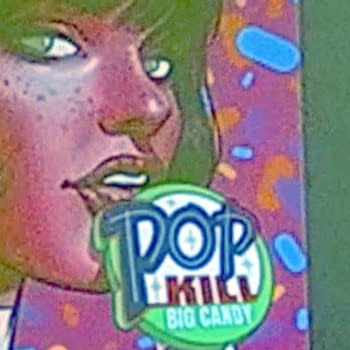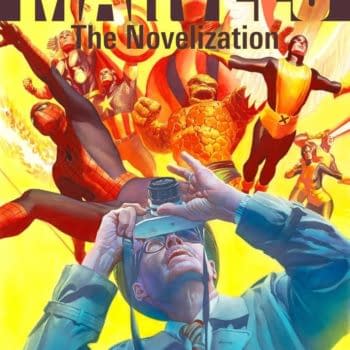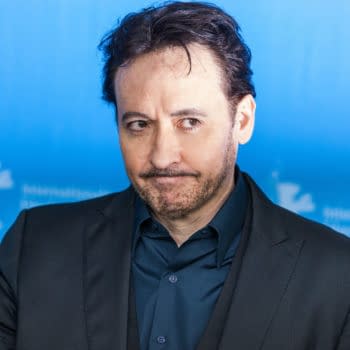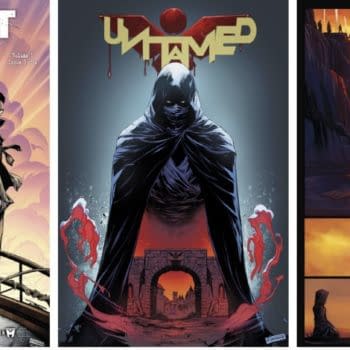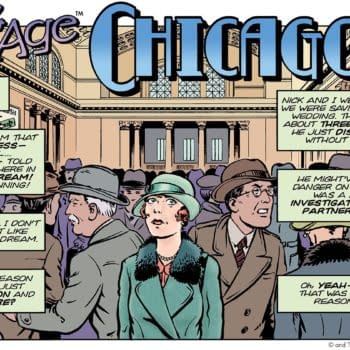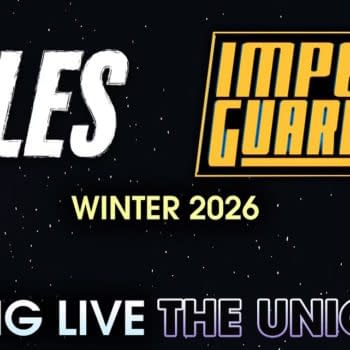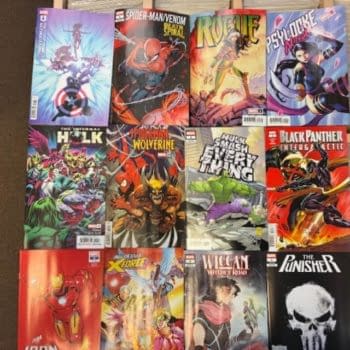Posted in: Comics | Tagged: Comics, hernandez, love and rockets
"We Don't Know How To Sell Out" – Talking With Los Bros Hernandez At This Year's National Book Festival
This weekend Washington DC was host to the Library of Congress' annual National Book Festival. The festival is complete with its own Comics and Graphic Novels section and every year the festival puts a spotlight on a few outstanding creators from the comics community. This year's spotlight fell on the inimitable Hernandez Brothers of Love and Rockets, and I had the honor and immense pleasure of sitting down with Jamie and Gilbert to discuss comics, pop-culture, Love and Rockets, how the Comics Code of Authority saved the superhero, what is on their pull list, and what we can expect next from the dynamic duo:
Tell me about how you see comics these days in relationship to pop culture, in relation to literature (we are at a literature festival after all), and how you two have seen it change over the thirty-plus years you've been making comics.
Gilbert: My feeling is that comics and graphic novels are the perfect medium for self-expression. Luckily, because people have begun to take it seriously over the years, we are getting people who aren't normally interested in Marvel and DC comics who are now interested in graphic novels and alternative comics because they see the range and how people can express themselves in different ways. What you get are serious minded people who want to do comics. I think that is a really good thing. It's not going to be all comics, but it's there. We didn't have that option available to us.
Jaime: We knew this going in to comics years ago, but now comics being here [at the National Book Festival] totally makes sense. They totally belong. I'm happy to be here. I'm happy they are allowing us to be here [laughs].
You two were pioneers in the indie comic scene when you began. So much that has happened in comics, especially in indie and alternative comics, happened because of you two. Could you talk a little about how you see the indie and alternative comic scene today? How has its changed since you two started?
G: Its changed simply in the sense that it now has a strength that comics-for-personal-expression never had before. That's the strongest thing for me. To me, it's a stronghold for creativity now. It's a solid place that's not going to go away. No matter how big the Marvel superhero movies get, they're just not going to affect people expressing themselves through different types of stories in comics. If the comics don't do so well, if they get less and less good in the future, that's only because the talent involved isn't that strong.
In my personal case I've stuck with alternative comics because I'm not slick enough to just throw it all away to make some money over at some big company. I just don't know how to make a good story that way. The only good stories, I think at least, are the stories I feel out and just do on my own whether it be Love and Rockets or a graphic novel. I've tried to do the superficial stuff, and get in there and try to make some money and get a hit mainstream comic, but it never worked. I just don't belong there.
J: We found out long ago that we don't know how to sell out. We couldn't if we tried [laughs].
There has been an emphasis over the past few decades on trying to convince people that comics are a legitimate art form, and that effort has been relatively successful. However, at the same time there has been a decline in sales even though there is an increase in the prevalence and legitimacy given comics. What do you think about that? Is it because kids aren't getting comics anymore? Is it because there aren't the same mass-scale ways of bringing comics to kids like newsstands and spinner racks like there used to be? Why do you think comics have grown in legitimacy but declined in sales?
G: The trouble is that kids just don't read comic books anymore, not only because they don't make comics for kids anymore, but because it's also a different world. They get their entertainment from other sources. Cartoons, video games, whatever is on the computer. Their entertainment and their inspiration for entertainment come from different sources now. There are no more spinner racks and there is no more desire to pick up a comic and read it. So now it's the domain of older kids and adults, and I'm fine with that because then we can express ourselves as adults to adults. We don't have to worry about offending little kids, or mommy getting mad because her kid picked up a lured comic book. If comics are for adults now, let's make them for adults then.
What are you two reading these days? Are there creators that you watch out for?
G: Our peers from the 80's are what I look out for. I still anticipate the next Dan Clowes comic that comes out every five or six years. Charles Burns. That's the trouble with our peers is that they only put out books every five years [laughs].
I have to admit I'm not really following too many new things unless it comes to me. I'm more interested in the past. I'm more interested in developing and inspiring my art through the artists of the past because it was a different world in the old days where it was meat-and-potatoes stuff where they would have to learn to tell a story. Even if it was still superficial on a technical level, it still gave me more to work from or to be inspired by. Whereas comic books now are more stylized and don't necessarily have that groundwork of what it was like to learn to draw well and tell a good story while making the book. I'm generalizing, and of course someone can show me something that proves me wrong, but for me I'm more interested in what has always inspired me: old comic books.
J: I've been collecting the reprints of old, pre-Comics Code of Authority horror comics. Being pre-code, they're all just gory as hell and completely nutty.
It was almost as if in the fifties the superhero comics were dying because the horror stuff from EC Comics really took off, and it wasn't until Wertham killed them with the code and everything was in limbo until they made the new Flash came along when everything took off for superheroes. It was almost as if the code saved superheroes [laughs].
Anyway, I've been really enjoying the artists in those early horror stuff because a lot of those artists were b-artists, so they tried harder. There is a certain charm and imagination in them that you can't get elsewhere. I've been trying to pick their brain and wonder, what made you make this story about a monster turtle? What were you guys thinking [laughs]? I love what came out of those artists who were just trying to make the deadline while also trying to out-horror the other guys because that's how you sold your comics. Specifically I've been reading the old Harvey titles, Chamber of Chills, Black Cat Mystery, and Witches' Tales.
G: Yeah I've been getting those hardcovers too. What I like about those comics is that a lot of those artists weren't suited to do vampire stories and they weren't suited to do gargoyle stories, but they did their best. They came off all wrong but at the same time they came off so right [laughs]!
We're all spoiled from Jack Kirby's monsters. We all know he made the greatest monsters, but what about the guys that didn't know how to make monsters? That really interests me for some reason. Their personality comes out in those monsters. They weren't Kirby's but they were theirs and there haven't been comics like that since.
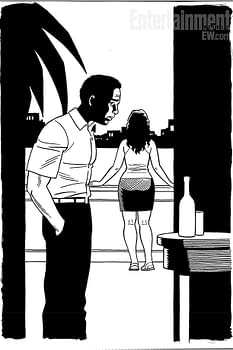
G: My next graphic novel will be a crime one. All the good reviews and the faith that people gave to me for Marble Season will be destroyed by the sex and violence of this new book [laughs]. I'll have to go back to being an underdog.
There is also the next Love and Rockets book. There will always be "a next Love and Rockets" because we want to continue doing that until we can no longer draw.
J: I do stuff on the side once and a while. I'm still illustrating for the New Yorker. I just illustrated a novel by Junot Diaz, This is How You Lose Her that will be coming out soon.
Love and Rockets: New Stories Vol. 6 will be out this October.
Junot Diaz's This Is How You Lose Her: Deluxe Edition illustrated by Jaime Hernandez will be available this Halloween.







